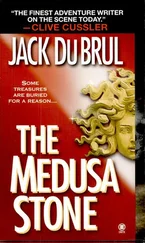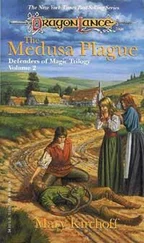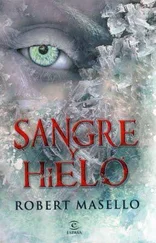Robert Masello - The Medusa Amulet
Здесь есть возможность читать онлайн «Robert Masello - The Medusa Amulet» весь текст электронной книги совершенно бесплатно (целиком полную версию без сокращений). В некоторых случаях можно слушать аудио, скачать через торрент в формате fb2 и присутствует краткое содержание. Жанр: Триллер, на английском языке. Описание произведения, (предисловие) а так же отзывы посетителей доступны на портале библиотеки ЛибКат.
- Название:The Medusa Amulet
- Автор:
- Жанр:
- Год:неизвестен
- ISBN:нет данных
- Рейтинг книги:5 / 5. Голосов: 1
-
Избранное:Добавить в избранное
- Отзывы:
-
Ваша оценка:
- 100
- 1
- 2
- 3
- 4
- 5
The Medusa Amulet: краткое содержание, описание и аннотация
Предлагаем к чтению аннотацию, описание, краткое содержание или предисловие (зависит от того, что написал сам автор книги «The Medusa Amulet»). Если вы не нашли необходимую информацию о книге — напишите в комментариях, мы постараемся отыскать её.
The Medusa Amulet — читать онлайн бесплатно полную книгу (весь текст) целиком
Ниже представлен текст книги, разбитый по страницам. Система сохранения места последней прочитанной страницы, позволяет с удобством читать онлайн бесплатно книгу «The Medusa Amulet», без необходимости каждый раз заново искать на чём Вы остановились. Поставьте закладку, и сможете в любой момент перейти на страницу, на которой закончили чтение.
Интервал:
Закладка:
“Who is it?” he bellowed, his eyes still trained on the girl. “What do you want?”
Cellini had already had to send his assistant Ascanio to the apothecary’s shop for a hair dye made of boiled walnuts and leeks-Caterina said she would not set foot outside until her hair was made black again-and now there was no one there to answer the damn door.
“It’s Captain Lucasi, and I am here at the behest of his lordship, Cosimo, the Duke de’Medici.”
The duke was the immensely wealthy ruler of Florence and patron to all of its greatest artists-Cellini among them. As for this Lucasi, Cellini knew from previous run-ins with the man that he was an officious prig, terribly impressed with the colored balls-the Medici insignia-adorning the front of his uniform.
“Damn it to Hell!” Cellini exclaimed, wiping his hands on a rag and throwing it on the worktable. “Let him in.”
Caterina wrapped herself in the bedsheet and, after making sure no wisps of white hair were escaping from under the scarf, opened the door.
Lucasi took her in slowly, looking from head to foot with a sly smile on his lips. “Shouldn’t you be wearing a yellow veil?” he said, referring to the garment prostitutes were required to wear in the streets of the city.
Caterina scowled and walked away.
Lucasi stepped into the room, looking all around. “What have I interrupted?” He poked his nose into the fireplace, where a pot of white beeswax was being kept warm and malleable, but when he ventured to touch it with his finger, Cellini shouted, “Get away from that, you dolt!”
The captain pretended to take no offense, but turned, with the smile still on his lips, and said, “You need to come with me.”
“Where? What for?”
Captain Lucasi shrugged. “The duke pays for everything you’ve got here,” he said, gesturing widely at the silver cups on the floor, the gems still loose on a table, and finally at Caterina, who had planted herself on top of the seaman’s chest, “and when he says come, you come.”
Cellini was within a hair of refusing, but even he knew better. When the Medici summoned, you answered their call, or wound up in a cell in the notorious Stinche. He had been there before, for public brawling, and had no wish to return.
“Give me a minute,” he growled, roughly scrubbing the wax off his hands and wrists with a bar of lye soap before pulling on a fresh shirt and blue tunic. Beneath them he wore the Medusa, which he had sworn to himself he would never again remove. “Take the charcoal from the hearth,” he said to Caterina, “and put a lid on the wax.” Marching toward the door, he said to Lucasi, “Let’s go then.”
The captain glanced down at his pants and shoes, still spattered with bits of wax, and said, “You don’t want to change those, too?”
“I thought you were in such a hurry,” Cellini replied, starting down the wooden stairs. If the duke thought his finest artist should live at his constant beck and call, then he’d better get used to seeing the signs of his toil.
Outside, the narrow street was relatively quiet, the heat having driven everyone indoors hours ago. The sun was lower in the sky, and the shadows of the other workshops fell over the cobblestones. A stray dog lay panting under the eaves of the ironmonger’s across the way, a grocer’s cart slowly rumbled along behind a swaybacked donkey. From a third-story window, an old woman beat a carpet against the balcony rail.
With Cellini leading the way, and Captain Lucasi doing his best to make it look like the artisan was in his custody, they marched to the Ponte alla Carraia, the ancient bridge where the wool carts from as far away as Flanders and France brought their wares to be sold and dyed and spun. The dyers, whose hands and arms were stained blue and green, used the Arno River below to rinse and wash the wool. But at this time of year, there wasn’t much to work with; the water level had fallen so low that dying fish were flopping on the banks. Dante called the river, which neatly divided the city in two, that “cursed ditch,” and Cellini would not have argued the point.
When they reached the Piazza della Signoria, the broad public square where some of the city’s greatest statuary was on display-Michelangelo’s unrivaled David, and Donatello’s Judith and Holofornes -Cellini slowed down, as he could never help but do, to admire the workmanship, and Captain Lucasi gave him a shove on the shoulder. Cellini whirled around and barked, “If you do that again, you’ll regret it.”
“Just keep moving,” Lucasi retorted.
“Barbarian.”
The duke’s palazzo, a huge fortress of pale stone topped by a crenellated tower, sat on the square like a great brooding giant, a fitting symbol of the Medici power and influence throughout Tuscany and beyond. Cellini had been there countless times before, but he never failed to notice the immediate hush that fell the moment he passed beneath its arched doorway, the sense of leaving the ordinary world and entering a far more rarefied precinct. Not that it instilled in him any trepidation. Since the day he was born and his father had christened him Benvenuto-or Welcome-he had felt at home anywhere. He was proud to say he was cowed by no man, and with only a few exceptions-his friend Michelangelo, the painter Masaccio-considered himself the superior of anyone he met, even dukes and princes and popes.
He would bend the knee, he often said to himself, but never the head.
The footmen recognized him, and even before the captain had announced their arrival, Cellini was mounting the marble steps to the salons that surrounded the central courtyard. He had powerful legs and moved like a bull with his head down, always plowing through any obstacle that might present itself. His shoulders were broad and strong, conditioned by years of sculpting and metalwork; his hands and fingers were knotted and hard from bending gold and silver to his wishes. He was thirty-eight years old but looked younger and could handle himself in a fight with men half his age.
“Where do you think you’re going?” Captain Lucasi complained when Cellini turned left at the top of the stairs and took his usual shortcut through the duchess’s suite of rooms. Everywhere, on walls and ceilings, in niches and on plinths above the doorways, there were remarkable works of art-frescoes by Benozzo Gozzoli, statues by Mino da Fiesole, paintings by Uccello and Pollaiuolo. Cellini never missed an opportunity to reacquaint himself with the past masters whose work he strove to surpass.
“Benvenuto! Is that you?” he heard, and stopped in one of the galleries. Perhaps this hadn’t been such a good idea, after all.
The duchess herself-Eleonora de Toledo-swept out from one of the antechambers, in a full-pleated gamurra and white satin cap, and he greeted her as pleasantly as he could. When she was cordial to him, it was always for a reason-and this proved to be no exception.
“I want you to look at these pearls,” she said, “and tell me what you think they’re worth.”
She held out a rope of seed pearls strung between her fingers.
“Are you planning to sell them?” he asked warily. He could already see that several were losing their luster.
“No, I want to buy them, and Messer Antonio Landi is asking six thousand scudi.”
“That’s a lot more than they’re worth.”
From the immediate frown on her face, he knew he had said the wrong thing.
“Are you sure? I think they’re quite beautiful.” She held them up to her neck, so that they caught the light from the windows.
“Pearls are not gemstones, my lady. They do not hold their color, as a diamond or a sapphire does. They are the bones of a fish”-this alone had always predisposed him to devalue them-“and as a result, they deteriorate. Look, these have already begun to do so.”
Читать дальшеИнтервал:
Закладка:
Похожие книги на «The Medusa Amulet»
Представляем Вашему вниманию похожие книги на «The Medusa Amulet» списком для выбора. Мы отобрали схожую по названию и смыслу литературу в надежде предоставить читателям больше вариантов отыскать новые, интересные, ещё непрочитанные произведения.
Обсуждение, отзывы о книге «The Medusa Amulet» и просто собственные мнения читателей. Оставьте ваши комментарии, напишите, что Вы думаете о произведении, его смысле или главных героях. Укажите что конкретно понравилось, а что нет, и почему Вы так считаете.












